School Year of Core Vocabulary Words – Older Student Lessons: AAC Resources for March
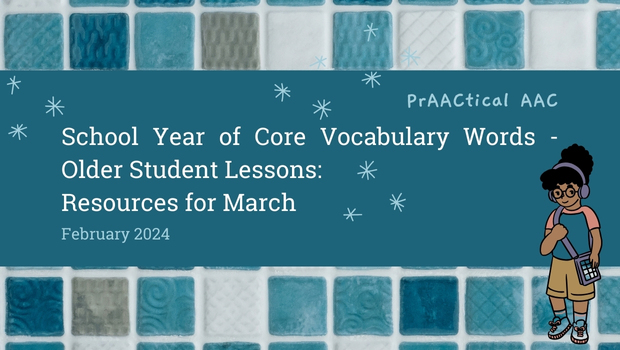
Today, as we prepare to turn another page in the calendar, let’s take a look at the wonderful resources that guest authors Michaela Sullivan and Lindsay Dougherty put together for the March core words. As expected, this dynamic team has some terrific ideas for your older students who are building their skills with core vocabulary.
Their slide decks have a wonderful selection of activities that teachers and therapists can use in highlighting the March core vocabulary words. In the post below, they also share helpful information on using extension, expansion, and elaboration in guiding students toward increased linguistic competence.
SCHOOL YEAR OF CORE- Older Student Lessons
INTRODUCTION- March 2024
To the Parents, Teachers, Educators, Related Service Providers, Speech-Language Pathologists, Paraprofessionals, Friends, and other curious professionals or communicators – Welcome back to month three of the newest iteration of the SYOC- Older Student Lessons (OSL), March edition.
We hope that as we begin to enter spring, you are feeling refreshed and ready for a month of celebrations and creativity. Thank you for your pursuit of new and engaging resources for your students. We hope they can renew your student’s interest in learning about core vocabulary and AAC.
The topics and holidays in the March SYOC-OSL’s are St. Patrick’s Day, Mardi Gras/Fat Tuesday, Women’s History Month, International Women’s Day, Daylight Saving Time, conversations/communication, friendships, healthy relationships, introducing ourselves in public, peer to peer interactions, professional work (i.e., job seeking, social media, jokes, and moods).
We hope your learners enjoy the multitude of activities offered in the March Weeks 1-2 and Weeks 3-4 Google Slide Decks. Once you make copies of the Slide Decks, they can be easily modified and adapted to meet your individual student/learner needs or remain just as they are.
We suggest that you consider downloading corresponding Symbol Charts containing March Level 1 and Level 2 words to help with navigating and organizing your lessons and provide hands-on, low-tech resources to use with your students.
Because we have provided over 210 slides for the month of March, it would be impossible to complete all of the activities over the month. Our motto is, “take what you want and leave the rest.”
Lessons incorporate a variety of activities to support core language understanding and use through motivating, engaging, meaningful activities.
The Google Slide Resources
Weeks 1-2 and Weeks 3-4 can be downloaded below.
All Slide Decks contain:
- Icebreaker Activities, (e.g. Jokes, Would You Rather, National days)
- Monthly Language Resources Include:
- “Tell us a Story” slides: to support students to co-construct narratives about past experiences using meaningful photos given WH question scaffolds.
- “Get Off the Computer” suggestions for Shared Reading and Share a Word to Describe your Day: We added a few slides with Shared Reading suggestions and a topic/interest inventory where students/adults can share the topics they are most interested in.
- Self Care: We will review different topics through the lens of self care.
- Student Reflection Time: students can use a visual rating scale to share whether or not they enjoyed an activity.
- Topics: Students will share if they agree or disagree with statements, as well as answer questions related to topics of the month.
- Symbol charts: include icons from a wide array of communication systems.
- Feelings Check-In: Including sentence frames and visuals
- Weekend reflection: Including visual icons and options.
- Music Choices: Listen to music corresponding to themes and core words
- Media: animated shorts and short, educational video clips
- Predictable chart writing
- Reading
- The Strategy of the Month is Extending, Expanding and Elaborating.
Please note that although these resources were created for AAC users, they can also be utilized effectively with a variety of students.
We hope you enjoy the School Year of Core-Older Student Lessons for MARCH.
THE WORDS
Weeks 1-2:
- Level 1 Words: they, live, place, ride, dress, ask, question, these
- Level 2 Words: early, late, agree, disagree, stay, leave, communicate, speak
Weeks 3-4:
- Level 1 Words: change, hear, front, back, loud, quiet, silly
- Level 2 Words: hide, find, full, empty, pick, important, grouchy, grumpy
Level 1 Words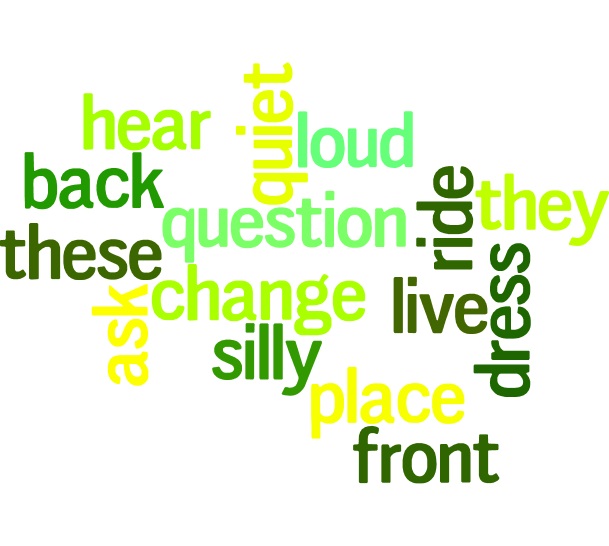
Level 2 Words
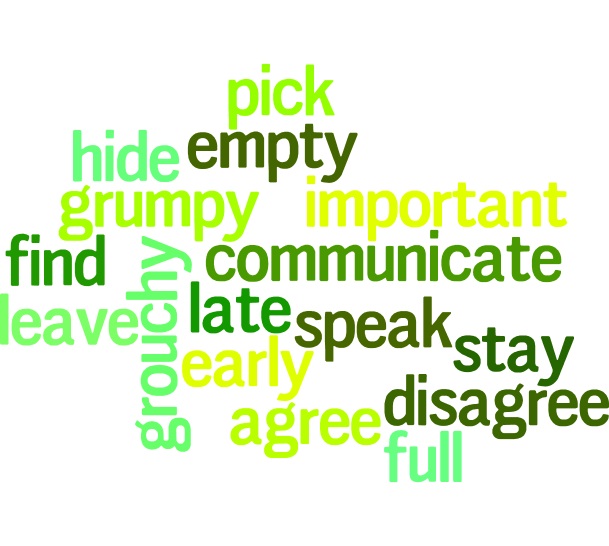
THE SYMBOLS
You can download grids with the symbols for this month’s words from the lists below. These handy visual tools can help us remember what words to focus on and be useful in our intervention and instruction.
Level 1 Words
- Avaz
- CoughDrop
- LAMP Words for Life
- Wordpower 60 Basic
- Unity 45 Sequenced
- Unity 60 Sequenced
- Unity 84 Sequenced
- Blank Grid (add your own symbols)
Level 2 Words
- Avaz
- CoughDrop
- LAMP Words for Life
- Wordpower 60 Basic
- Unity 45 Sequenced
- Unity 60 Sequenced
- Unity 84 Sequenced
- Blank Grid (add your own symbols)
Strategy of the Month:
EXTENDING, EXPANDING AND ELABORATING
The AAC strategy of Extending, Expanding, and Elaborating focuses on communication partners responding to what students express by providing immediate (simultaneous) verbal and AAC system modeling based on the student’s unique language goals. As an example, students at the single-word level may have a goal to produce two-word utterances, and therefore, the ‘add a word’ approach could be utilized (providing modeling by adding a word to the utterance/word produced). Such added words could be targeted as pronouns, verbs, or descriptors (for added specificity). Intermediate to advanced communicators would have different, higher-level language goals and targets that are individualized. When using the Extending, Expanding, and Elaborating approach, it is suggested that such modeling is carried out in a positive, upbeat tone and with correct grammar and syntax.
Please find the following additional resources on Extending, Expanding, and Elaborating below. These resources will be helpful for individual learning and/or for team training.
We will be incorporating this strategy in all of our Activity Sheets surrounding the targeted core words. Until it becomes a habit, please try to create intentional opportunities to practice this strategy.
Resources
- Expanding AAC Learners’ Single Word Utterances PrAACtical AAC, Carole Zangari, March 2018
- Building Sentence Length: Say it Spontaneously PrAACtical AAC, Robin Parker, June, 2014
- More Thoughts about Reinforcement in AAC Therapy, PrAACtical AAC, Carole Zangari, February 2014
- Language Facilitation Strategies, PrAACtical AAC, Carole Zangari June 2, 2012
DATA COLLECTION & ACCOUNTABILITY FORMS
Taking data to measure performance and keeping track of our own modeling behavior are two things we can do to strengthen our AAC teaching. Here are some forms that you can use to support those efforts.
This posting is dedicated to all of the amazing Educators, SLP’s, parents and therapists who are making a difference every day!
About the School Year of Core-Older Student Lessons Series Authors
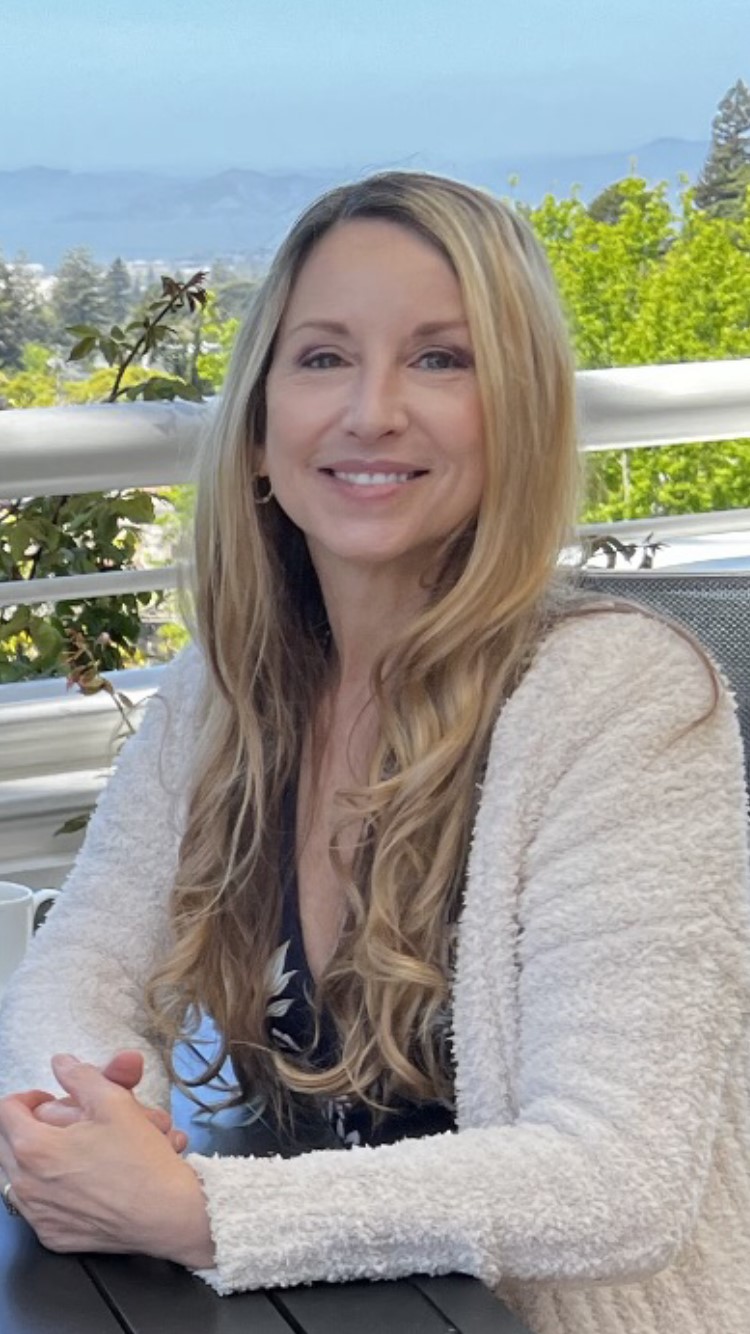 Michaela Sullivan is an SLP who specializes in the fields of AAC and AT. She currently works within the San Francisco Unified School District on the AAC Support Team where she supervises graduate student interns, works in a transition program and on special projects. Ms. Sullivan also has a private practice. She has been a presenter in the field of Speech-Language Pathology and AAC at state and national conventions. She was one of the creators of the Original School Year of Core first released in 2020 on the websites: PrAACtical AAC and AAC Language Lab. Ms. Sullivan works closely with San Francisco State with Project AAC for ALL, SYOC Bilingue and the TRAAC Project. Ms. Sullivan serves as a Board member, Treasurer and Volunteer for the Nika Project, providing services, supports, resources, training, and repurposed equipment to help meet the needs of individuals who use AAC systems both locally and internationally.
Michaela Sullivan is an SLP who specializes in the fields of AAC and AT. She currently works within the San Francisco Unified School District on the AAC Support Team where she supervises graduate student interns, works in a transition program and on special projects. Ms. Sullivan also has a private practice. She has been a presenter in the field of Speech-Language Pathology and AAC at state and national conventions. She was one of the creators of the Original School Year of Core first released in 2020 on the websites: PrAACtical AAC and AAC Language Lab. Ms. Sullivan works closely with San Francisco State with Project AAC for ALL, SYOC Bilingue and the TRAAC Project. Ms. Sullivan serves as a Board member, Treasurer and Volunteer for the Nika Project, providing services, supports, resources, training, and repurposed equipment to help meet the needs of individuals who use AAC systems both locally and internationally.
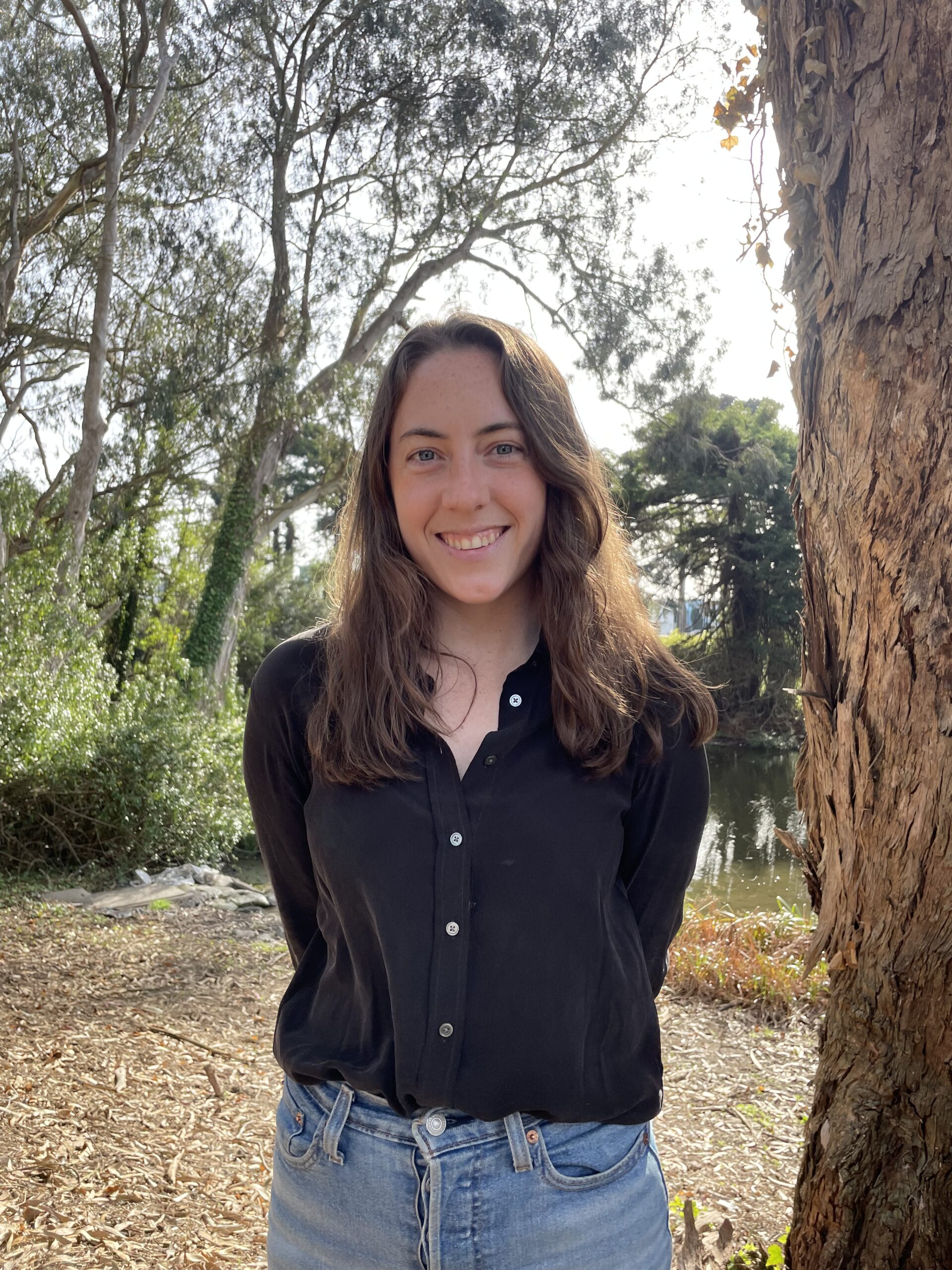 Lindsay Dougherty is a Speech & Language Pathologist with specializations in Autism and AAC. She currently works for the San Francisco Unified School District, providing direct services to students with complex communication needs and supporting her fellow SLPs on the AAC Support Team. Lindsay works on a team of professionals, implementing a Language Systems First curriculum for Pre-K and Kindergarten classrooms across the school district. The team provides a universal language system, staff and parent training, and AAC support to teachers and SLPs. She is also the faculty advisor of her middle school’s Best Buddies Club, where she supports students with disabilities in building meaningful friendships with peers.
Lindsay Dougherty is a Speech & Language Pathologist with specializations in Autism and AAC. She currently works for the San Francisco Unified School District, providing direct services to students with complex communication needs and supporting her fellow SLPs on the AAC Support Team. Lindsay works on a team of professionals, implementing a Language Systems First curriculum for Pre-K and Kindergarten classrooms across the school district. The team provides a universal language system, staff and parent training, and AAC support to teachers and SLPs. She is also the faculty advisor of her middle school’s Best Buddies Club, where she supports students with disabilities in building meaningful friendships with peers.
Our Featured Core Contributors for the Month of March include:
Jadine Veluya, Christelle Marcelo, Joseph Cachapero
Filed under: Featured Posts
This post was written by Carole Zangari
